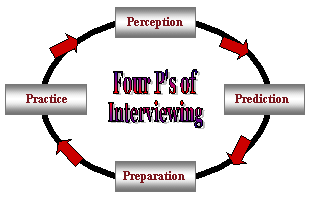Interview Preparation
It is important to remember that the job interview is the ultimate test to determine whether you receive a job offer. All of your other job search activities are designed to get you invited to a job interview.
Getting Mentally Prepared
 In the interview it is important that you are knowledgeable about the organization and can show that you are truly interested in the company. The first step in preparing for the interview is researching the company, the job, and if possible, the interviewers.
In the interview it is important that you are knowledgeable about the organization and can show that you are truly interested in the company. The first step in preparing for the interview is researching the company, the job, and if possible, the interviewers.
The following are a few words of wisdom to improve your job interview results.
1) Interviews by a human resources recruiter are likely to be much different than interviews by a hiring manager. The typical HR recruiter is highly trained and skilled in asking relevant (and legal) questions, but will tend to ask more general questions. The typical hiring manager has far less experience in interviewing, but will ask questions more focused on the specific needs of the job. You must be prepared for both.
2) Knowledge is power, and the more knowledge you have about what to expect during the interview, the more powerful and effective your responses will be. Carefully evaluate the requirements of the job; then within that context, think about how you can differentiate yourself from other applicants.
3) As you practice and during the actual interview, avoid the use of slang, profanity, or any other language that may not be "politically correct." Also, watch out for any nervous speech habits, such as frequently repeated phrases or filler words such as starting sentences with "Ah ..."
4) Do not inappropriately "bad mouth" a former employer or supervisor. If there were problems in a past job and you are asked to discuss them, be professional in how you describe them.
Common Types of Job Interviews
The screening interview is a preliminary interview designed to screen a large number of job candidates so that those less-qualified can be eliminated from consideration. This results in a smaller, more manageable group of qualified applicants that will receive a more thorough interview. Screening interviews may be conducted in person, but are most often done by phone.
A standard interview is normally conducted after the preliminary screening is complete. Standard interviews are typically done face-to-face with one or more interviewers. For most positions, they take 30 to 60 minutes to complete. Generally, the higher the level of position you're applying for, the longer the interview will take and the more people you will talk to. For example, interviews for executive-level positions can take one or more full days to complete and may entail interviews with 10 or more people, including possible interviews with members of a board of directors.
A panel interview is much like a standard interview, but is usually conducted by a panel of three or more people. Panel interviews often include a representative from the human resources department, the hiring manager, one or more peer-level staff, and others who the applicant is likely to work with. If invited to a panel interview, try to find out in advance who will attend so you can be more specific in the types of answers you provide.

Phone interviews are normally part of a preliminary candidate screening process. However; in today’s job market, the phone interview is also being used as a standard interview with more than one participating interviewer on the call. Some phone interviews include video capabilities. If so, you may be asked to visit a site that provides video conferencing services.
Within the Job Interview Trainer you'll find over 600 sample questions listed by question category. We've also included a mock interview that will walk you through a typical job interview from start to finish. These tools will help you with all of the interview types covered above.
Interview Question Variations
Some interviews will focus on skills and experience (skills-based). Others will focus on behavioral attributes (behavior-based). Regardless of the type of questions being asked, always try to relate your answers to the specific requirements of the job.
Skills-based interviews are easier to prepare for because you will be asked about your skills and background. You can tap into the work you did to prepare your skills inventory as preparation for this type of interview. Where possible, try to fit in some of your successes and special accomplishments when answering these types of questions.
A variation of skills-based interview questions is the business case. Often used by consulting firms but growing in popularity among other organizations, these questions present the applicant with a hypothetical business case. The interviewer asks how you would go about evaluating and solving the business problem presented in the business case. This requires you to call upon your experience and skills in understanding and dealing with business problems.
A behavioral interview question is one that typically starts with a phrase such as "Tell me about how you ..." and seeks to determine how you have dealt with past situations, as well as hypothetical situations the interviewer might present. It tells the interviewer how you typically approach a problem and the steps you take to deal with it.
Behavioral questions are normally best answered by giving examples of real-life experiences that demonstrate your ability to do the job in question. It is a good idea to anticipate such questions and prepare some success stories to share with the interviewer. Utilize examples of past behaviors and talents that are consistent with the behaviors required in the new job.
The Four P's - Keys to Job Interview Success

For simplicity, this diagram narrows the key ingredients of a successful job interview to four elements. They are perception, prediction, preparation and practice. You must be perceptive about what the employer is looking for, be able to anticipate or predict what the interviewer needs or wants to hear, prepare your responses accordingly, and then practice, practice, practice.
If this sounds like it takes some effort, it does. But it is effort that can pay off immensely when you get the job offer you are seeking.
Let’s talk about the four P’s (Perception, Prediction, Preparation, and Practice) in more detail.
Perception
It is up to the applicant (you) to perceive the requirements of your target job and the needs of your target employer. You must also be keenly aware of your own skills and capabilities. Within this context, and the context of the person interviewing you, you must develop a workable interviewing strategy.
You must also be perceptive during the interview. Pay close attention to the interviewer and how they react to your answers. Even the most stoic interviewer will give some clues as to how they perceive your answers. Pay close attention and adjust your responses accordingly.
Prediction
Prediction and perception are closely related. With good perceptive skills, you’ll be in a better position to predict what the employer needs or wants to hear from you. You'll then be able to anticipate the kinds of questions that will be asked. We aren’t talking about crystal ball prediction, but prediction based upon facts and legitimate assumptions.
Clearly, there is no way to know in advance the exact questions that will be asked by the interviewer. However, with enough research and thought, you can come close to guessing the types of questions you can legitimately expect. Reviewing the job description, job advertisement, or a list of job specifications can go a long way toward improving your ability to predict questions that might be asked.
Preparation
When it comes to the job interview, your preparation becomes much more focused. You can now zero in on the particular job title you’re applying for, the particular employer, and the kinds of questions the interviewer is likely to ask. You can take all of your skills, competencies, and experience into consideration and start to craft a set of responses within the context of these variables.
Begin by conducting additional research on the company you hope to work for. Learn everything you can that may be relevant to the position you seek. Using this information, start planning the kind of information you might present during the course of an interview.
Practice
Just as athletes practice before a game, job seekers need to practice before an interview. Practicing means taking the first three P’s (Perception, Prediction, and Preparation) and incorporating them into as realistic an interview exercise as you can.
Think about the job you are applying for and what, if you were the interviewer, you would want to hear from an applicant. The most important source of information about what the interviewer wants to hear (and is likely to ask about) can be found in the job positing, ad, job description, or whatever other information is available to you about the specific job.
You might think of a fifth "P" (Proactive) as you practice. Try to anticipate the details the interviewer might seek from you, and then be proactive in presenting enough detail so that the interviewer won't have to ask you to elaborate. Be careful, however, not to go off on tangents or take too much time for your responses. And don't be bashful about asking questions of the interviewer. This is part of being proactive and it enables you to be sure you fully understand what the interviewer is looking for.
The Job Interview Trainer, which includes over 600 sample questions, has been designed to simplify the process of practicing for an interview. In the Job Interview Trainer, we've included a Question Category called Common Interview Questions. It lists 20 of the most commonly asked interview questions, including suggestions on how to respond to each one. You can access that list via the following link, or via the Job Search eBook Table of Contents: Common Interview Questions.
Considerations During the Interview
1) Avoid appearing nervous. A big part of overcoming the perception of nervousness is to be aware of nervous traits and avoid them. If you nervously bounce your foot, keep it firmly on the ground. If you nervously play with coins in your pocket, don’t bring any with you. If you nervously fidget with your car keys, leave them in your briefcase. You get the idea!
2) Show you are interested. A positive attitude, a firm (not painful) handshake, a smile, and looking people in the eye when talking with them can go a long way toward inspiring confidence. Lean forward, keep your head up, and avoid slouching. Sometimes it’s the little things that make a difference. Don’t overlook simple things or common courtesy when dealing with people.
3) Interviewers have a wide variety of skills, backgrounds, and approaches to the interview process. You won’t know how they will approach your particular interview until the interview starts. Watch for clues and don't be afraid to ask questions.
4) There are a variety of accepted interview practices, and some that aren’t so accepted, yet still practiced. You must be prepared to effectively deal with whatever you are presented with. Don't be thrown off or flustered by an inappropriate or poorly worded question. Stay calm and keep moving forward.
Dealing with difficult Interview Issues
Almost everyone has something in their work background that isn't as good as they'd like it to be. The following are some of the more common problems that can be encountered during an interview. The eBook provides additional detail with some suggestions on how to overcome them.
Gaps in Your Employment History: Employers will almost always ask about gaps in your employment history. Since most people need to work for a living, periods of time when you don't have a job tend to raise a red flag. As long as there is a legitimate and explainable reason for a gap in employment, there is not likely going to be any problem in the interviewer's eyes.
Lack of Formal Education: If your formal education is less than what is typically required for the job you are applying for, you'll want to minimize that fact during the interview. Emphasize your work experience, life experience, talents, accomplishments, on-the-job training, or other indicators of your ability to perform successfully in the job.
Being Fired from a Previous Job: You should always assume that your reasons for leaving former employers will be explored by the interviewer. As such, you need to prepare accordingly. Being fired from a previous job doesn't have to be a major problem for you. Part of overcoming the negative connotations associated with being fired is having a positive attitude and openly discussing the termination with a positive spin on it.
Moving Around from Job-to-Job: Employers tend to get nervous about employees that move from job-to-job after short-term employments. They know that it costs the company a lot of money to recruit, hire and train new employees. They don't want to risk having them leave shortly after their productivity finally gets to an acceptable level. If you have had lots of different jobs in a short time span and the interviewer questions you about it, demonstrate that there were legitimate and logical reasons for so many job changes. Your goal should be to reduce the risk they feel that you will have a short-term employment with them.
Lack of Experience: Sometimes raw talent is more important than experience. The difficulty, of course, is demonstrating this during your interview. If you are fairly new to the workforce, you need to stress education, training, life experience, personal talents, or other indicators of your ability to perform successfully in the job. Talk about your enthusiasm and strong work ethic. Discuss examples of things you have done in the past that demonstrate your skills.
Concern About Your Age: Obviously, it is difficult to substantially disguise your age when you are having a face-to-face interview. In the U.S. there are various prohibitions against discrimination on the basis of age; however, not all age groups are covered. If you are concerned your age may be a factor in your employability, the following may help.
- If you are very young, try not to dress in obviously youthful clothes and avoid youthful fads in your appearance. Observe how people five or ten years older than you are dressing and emulate their style.
- If you fear you may be perceived as old for the type of work you are applying for, only give the most recent employment history(20 years is most common for a lot of experience). Consider the professional environment in which you will be interviewing. Dress appropriately for the job, the workplace and your style.
Thank-You Notes to Follow Up the Interview
You should always follow up an interview with a thank-you note or letter. View a thank-you note as a tool that enables you to continue marketing yourself. It is an opportunity to enhance the interviewer's impression of you and to emphasize your key skills or accomplishments that relate to the job. It can also give you an opportunity to mention an important point that you neglected to think of during the interview.
Keep your thank-you note or letter focused and fairly brief. If the interviewer raised any concerns about your background, this is an opportunity to address those concerns. The most important thing you can do, however; is to reiterate the skills and expertise you would bring to the job.
If the job opening came to your attention via the Internet and most of your correspondence has been via email, it is usually viewed as acceptable to send your thank-you note via email. However, it may still a good idea to follow up with a note sent through the standard Postal Service. This gives a better impression and adds emphasis to your interest in the job opening.
As with any other written communication utilized in your job search, you want your thank-you note to demonstrate good communication skills and attention to detail. Be sure your spelling, punctuation, and overall sentence structure are within acceptable norms.
Under the Forms menu, you'll find sample Thank-you Note Templates that will help you get started.
Want more information?
The eBook contains substantially more information and additional detail on interviewing and thank-you notes.